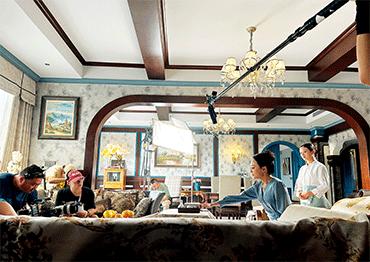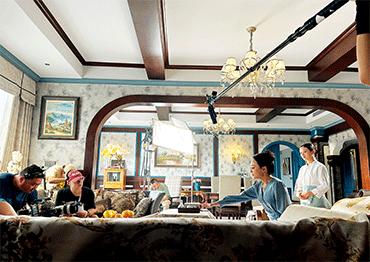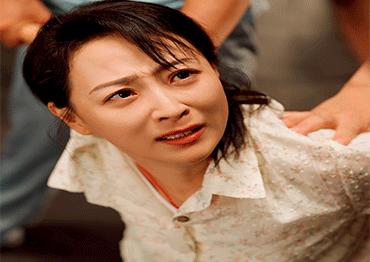Actress Wu Qian has already starred in three ultrashort dramas aimed at older audiences in September. “I’m an old hand in this field now,” she joked. Wu is known for portraying older characters. Her first role at the age of 22 was as a mother of a 5-year-old boy. Now in her 30s, Wu often plays women in their 50s and 60s.
One of her most notable recent roles was in the ultrashort Flash Marriage, My Husband Is a Billionaire. She plays Shi Xiaoxiu, a single mother in her 50s who marries Lei Zhiyuan, a seemingly humble man who turns out to be filthy rich. Released on August 29, the show went viral, generating 30 million yuan (US$4.2m) in its first week. By October 28, it had 2.5 billion views on short-video platform Douyin.
“I’ve been acting in films and TV shows for a decade, but this was the first time I got recognized by the public,” Wu told NewsChina. Now, Wu has over 121,000 followers on Douyin.
Wu explained the appeal of the drama. “I wanted to show the beauty and goodness of a middle-aged woman. When Shi Xiaoxiu sits by the roadside, carefully mending Lei Zhiyuan’s worn clothes, it stirs something in him. That’s the kind of romance we see between older people – not youthful passion, but something soft and tender.”
While Wu never anticipated the massive popularity of the drama, she recognized its deeper emotional impact.
“Middle-aged and elderly viewers who feel unhappy in their marriage might find some solace in this story. They long to see that a divorced woman can find true love and happiness even if she’s not young anymore,” Wu said. The show’s hopeful message resonates with viewers seeking love over 30, who often feel overlooked by the Chinese entertainment industry, Wu added.
In China, single women over 30 or those who are divorced are often unfairly labeled as struggling to find love. The term shengnü, or “leftover women,” is commonly used to describe women over 27 who remain single, carrying a negative and dismissive connotation that they are past their prime.
The increasing number of ultrashorts for older audiences reflects a shift in China’s entertainment landscape. As of this year, many production companies, including Ting Hua Dao (the production company behind Flash Marriage and other popular ultrashort dramas), have pivoted content to older demographics.
A Ting Hua Dao executive said the company started focusing on older audiences in February 2024 after noticing a trend: the primary demographic willing to pay for micro-dramas had shifted from people in their 30s to those aged 40-60.
This shift is evident as young actors see more offers for older roles. Shoots for ultrashort dramas often last 16 hours a day, which leads production teams to opt for hiring younger actors to play these characters instead of more age-appropriate ones.
Actress Xu Meijia, 27, recently played a 45-year-old retired athlete in a sport-themed drama, while 22-year-old Fu Bolin’s first role was a middle-aged antagonist. Even Wang Quan, a well-known actor who has worked in TV for over 14 years, has transitioned to ultrashorts since 2021. He noticed a stark difference in dramas targeting younger audiences, which were over-the-top performances and tired tropes. “I performed the same kinds of roles in similar ways. All I did was rant, pound tables, slap people’s faces and kneel,” Wang said.
Dramas for older audiences, according to Wang, are comparatively more sophisticated. “Now I make my characters’ actions more reasonable and convincing,” he told NewsChina.

 Old Version
Old Version


